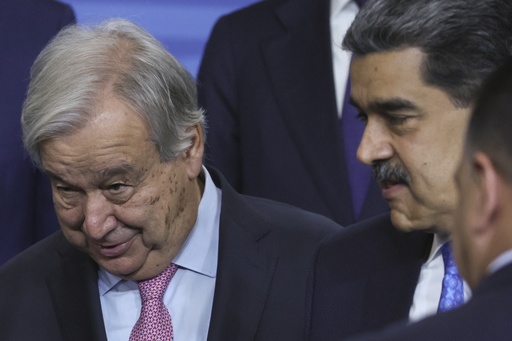
SAO PAULO — The Brazilian government has expressed surprise at the escalating tensions with Venezuela, particularly regarding the recent confrontational language used by Venezuelan authorities. The Foreign Ministry made it clear on Friday that it was taken aback by the “offensive tone” directed toward Brazil amidst ongoing diplomatic strains.
In the last few days, Venezuela has ramped up its criticism, targeting Brazilian foreign relations officials and President Luiz Inácio Lula da Silva, a former ally. The Brazilian Foreign Ministry responded in a statement, saying that such personal attacks and rhetorical escalations are not in line with Brazil’s respectful approach toward its neighbor and its citizens.
The friction has notably intensified following comments made by a key advisor to President Lula, who highlighted Brazil’s lack of support for Venezuela’s bid to join the BRICS group at a recent summit held in Russia. This has added fuel to existing tensions linked to disputed outcomes from Venezuela’s July presidential elections, as Brazil and other nations have called for greater transparency.
Venezuela’s Foreign Ministry retaliated by summoning Breno Hermann, Brazil’s chargé d’affaires, to convey its strong discontent with what it termed “recurrent interventionist and rude statements” from authorized Brazilian spokespersons. It also accused Celso Amorim, Brazil’s former foreign minister and current special advisor, of acting as a “messenger of American imperialism” and jeopardizing the goodwill between the two nations.
Initially, Brazil chose to remain silent to avoid exacerbating the situation; a diplomatic source indicated that the ministry had preferred to withhold comments. However, this stance altered after the Venezuelan National Police posted an image on social media featuring a silhouette of President Lula against the Brazilian flag, with the slogan: “If you mess with Venezuela, you wilt.”
Venezuela’s message asserted its commitment to independence and sovereignty, declaring that it does not entertain pressure from any external forces. In response, the Brazilian Foreign Ministry reiterated its respect for the sovereignty of neighboring countries, emphasizing its non-intervention policy. The ministry also illustrated Brazil’s interest in Venezuela’s electoral matters as stemming from its role as a witness to the 2023 Barbados Agreements, which regulated electoral conditions between the Venezuelan government and opposition.
In a hearing held on Tuesday, Amorim addressed the existing discomfort in diplomatic relations, attributing it to Venezuela’s failure to disclose comprehensive election results. He stated that improving ties would hinge on Venezuela’s behavior, although he did not outline specific expectations.
Venezuela’s authorities claimed that they could not release detailed results due to a hacking incident affecting their website. Concurrently, the principal opposition coalition managed to obtain voting receipts from over 80% of the electronic voting machines, which they published online, asserting that their candidate, former diplomat Edmundo González, had overwhelmingly defeated Maduro.
Following the July 28 election, Lula, along with the Colombian and former Mexican presidents—both with favorable views towards Maduro—attempted to mediate the electoral standoff, but their efforts did not yield any results. Maduro has since tightened his grip on power, made changes to his Cabinet, and arrested over 2,000 opponents.
The BRICS bloc, which originally consisted of Brazil, Russia, India, China, and South Africa, has since welcomed new members including Iran, Egypt, and Saudi Arabia. Brazil objected to Venezuela’s inclusion in BRICS during the recent summit, with Amorim asserting that Brazil does not support indefinite expansion of the bloc. He remarked that member states should have the capacity to exert influence that fosters regional representation, a criterion Venezuela, in Brazil’s perspective, does not currently fulfill.
Venezuela’s Foreign Affairs Ministry has critiqued Brazil’s conduct as “irrational behavior,” drawing parallels to the economic sanctions inflicted on it by the United States.
